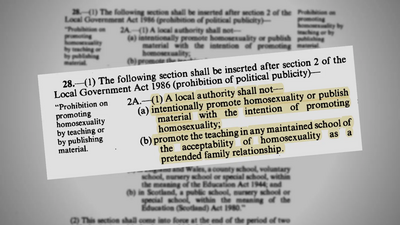The Lib Dems’ Role in the repeal of Section 28 – 19 years on

This week marks 19 years since the repeal of Section 28 of the Local Government Act in England and Wales, a landmark date for LGBTQ+ equality ensured by the Liberal Democrats.
Introduced by Margaret Thatcher's Conservative government in 1988, Section 28 (or Clause 2a in Scotland) was a controversial and dangerous legislative amendment to the Local Government Act, which sought to 'prohibit the promotion of homosexuality by local authorities.'
The introduction of Section 28 was of little surprise to many campaigners following Thatcher's address at the 1987 Conservative party Conference where she stated:
"Too often, our children don't get the education they need-the education they deserve. Children who need to be taught to respect traditional moral values are being taught that they have an inalienable right to be gay. And children who need encouragement-and children do so much need encouragement-so many children-they are being taught that our society offers them no future. All of those children are being cheated of a sound start in life-yes cheated."
Once enacted, Section 28 prevented any form of positive depiction of LGBTQ+ life in schools. Teachers were banned from teaching or discussing LGBTQ+-related items, LGBTQ+ literature, or books containing a depiction of positive LGBTQ+ relationships, and additional resources were removed by schools. This was in addition to the disbandment of LGBTQ+ groups and clubs both within schools and those facilitated by local authority services in the community.
Upon its introduction, the Liberal Democrats were the first party to openly oppose the legislation. As a party, we were clear that teachers must be allowed to support pupils who come out to them, and schools must be allowed to provide information that presents LGBTQ+ attraction and relationships as valid and normal.
In 2003, after 15 years of campaigning and successive defeats in the House of Lords, the Liberal Democrats were the first to introduce legislation to repeal the act with a clause introduced by now-party leader Ed Davey. Speaking at the time, Ed said, "We need the protection of such rights in the framework of law and, sometimes, in the framework of the constitution."
Once successfully passed by the lords, the revised Local Government Act received Royal Assent on 18 September 2003, and came into effect two months later on 18 November 2003.
Whilst Section 28 may have been repealed, it has left lasting damage in our society that will continue to impact generations, especially the LGBTQ+ community who faced immense pressure to censor themselves or act to 'fit' into society.
Speaking to PinkNews in November 2019, 16 years after Section 28 was finally scrapped, Ed Davey said "I am proud to have moved the clause that abolished Section 28 once and for all. But we still have so far to go."
In Scotland, the repeal of what was called Section 2a there came 3 years earlier when the Labour/LIberal Democrat coalition faced down a brutal campaign to Keep the Clause which was run by Stagecoach founder Brian Souter.
The Liberal Democrats are the UK's leading political party on LGBTQ+ equality issues, and as the party body for gender and sexual minorities, LGBT+ Liberal Democrats will continue to develop and promote progressive policies and campaigns, and champion the voices of our diverse communities both outside and within the wider party.
